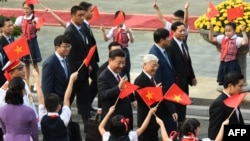A possible visit to Vietnam by Chinese President Xi Jinping would be likely to test Hanoi’s balancing act between Beijing and Washington, analysts say.
Reuters reported last week that Vietnamese and Chinese officials are preparing for a possible meeting between Vietnamese Communist Party chief Nguyen Phu Trong and Xi in Hanoi at the end of October or early November.
The visit has not been announced by Beijing or Hanoi.
The Chinese Embassy in Washington declined a request for comment and deferred the question to the Foreign Ministry in Beijing. VOA Vietnamese called the ministry and left a voice mail but did not receive a response.
If the visit takes place, the Vietnamese leader will have hosted the leaders of two superpowers in his country in less than two months.
Hanoi elevated its ties with Washington to a comprehensive strategic partnership, placing the U.S. on par with China in its diplomatic engagement, during U.S. President Joe Biden’s visit to Hanoi in early September.
Tricky balancing act
Analysts say Xi’s visit would be a litmus test for Hanoi’s so-called "bamboo policy" of balancing the interests of competing powers.
Le Hong Hiep, senior fellow at the ISEAS-Yusof Ishak Institute in Singapore, told VOA Vietnamese this week that Beijing is not “comfortable” to see Vietnam upgrade relations with and becoming closer to the U.S.
"Xi's possible visit is part of China's efforts to at least maintain Vietnam's balance in its foreign policy towards the U.S. and China, if not trying to pull Vietnam to China’s side," Hiep said.
“Beijing sees the need and seeks to rebalance its influence, as well as reaffirm its status and influence following Hanoi’s upgradation of relations with Washington,” Hoang Viet, a lecturer at Ho Chi Minh City University of Law, told VOA Vietnamese.
According to the Reuters report, Hanoi and Beijing are discussing the text of a joint statement that would pair their nations in a “community of common destiny.”
Xi first proposed the concept of a “community of common destiny” in late 2012, based on a millennia-old Chinese vision of a world where people would live in perfect harmony and would be as dear to one another as family, according to a report from China’s official state media outlet, Xinhua.
Alexander Vuving, a professor at the Daniel K. Inouye Asia-Pacific Center for Security Studies in Honolulu, said Xi will push Vietnam to join China's "community of common destiny" to try to build a coalition to counter Washington.
“If Vietnam agrees to join China's ‘community of common destiny,’ this would be touted as an upgrade of the current ‘comprehensive strategic partnership of cooperation’ between China and Vietnam,” Vuving said in an email to VOA Vietnamese this week.
Joining the community would be an upgrade to Vietnam’s relationship with China, and “would be interpreted by China that Beijing is always closer, or ahead of, or above Washington in relations with Vietnam,” Vuving said.
Vietnam remains the only country in mainland Southeast Asia that has not joined China's "community of common destiny," according to Vuving.
Hiep said Vietnam will try to maintain its long-standing foreign policy of developing balanced relations with major powers and diversifying its foreign relations.
“China remains an important partner of Vietnam’s, economically, politically and strategically, but China is just one of the major powers with which Vietnam builds relations, and the development of Sino-Vietnamese relationship does not necessarily mean that Vietnam has to abandon or lower its relations with other partners, including the United States," said Hiep.
Territorial dispute
Separate from striking a balance between Washington and Beijing, Vietnam has unresolved bilateral issues with China, according to analysts.
Nguyen Ngoc Truong, former president of the Center for Strategic Studies and International Development, a government-affiliated think tank in Hanoi, told VOA Vietnamese that Vietnam's top concerns are "promoting economic and trade relations with China" and "ensuring a peaceful, stable and secure environment, including the South China Sea issue.”
Vietnam, with the Philippines, Malaysia and Brunei, opposes China’s sweeping claims to much of the South China Sea. Since May 2014, when Beijing began building on the sea’s outcroppings it controlled, there have been frequent confrontations between Vietnamese and Chinese law enforcement ships in the disputed region.
The sea is believed to be rich in oil and gas resources and vital to international navigation, with nearly $3.4 trillion of trade passing through it each year.
Carl Thayer, professor emeritus at the University of New South Wales in Australia, said Trong is expected to raise the South China Sea issue during the meeting with Xi.
Seeking ways to “properly handle emerging incidents at sea and maintain security and stability at sea” will be on the agenda if the meeting occurs, according to Thayer.
As for Xi, he is likely to announce measures that China will take to increase the value of two-way trade by removing customs bottlenecks, allowing increased market access for Vietnamese agricultural products and an expansion of Vietnamese trade promotion offices in China, Thayer said.
Xi will also promote connectivity through aviation, land and railway transport, including the development of the Lao Cai-Haiphong railway, he added. The railway will be part of China’s Belt and Road Initiative, according to reports on VietNamNet and Dan Tri news outlets.







